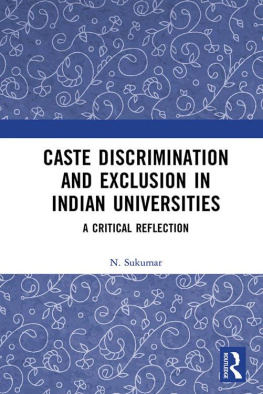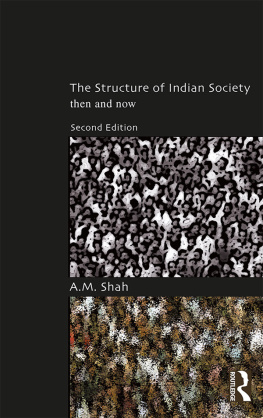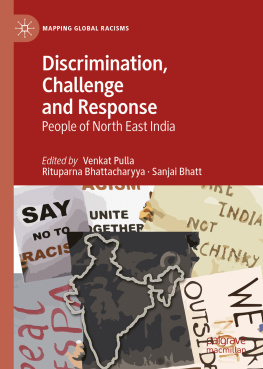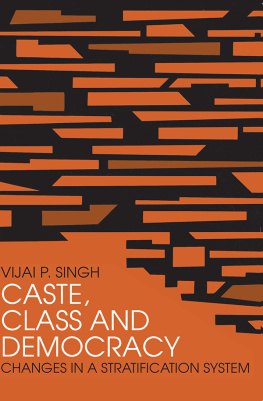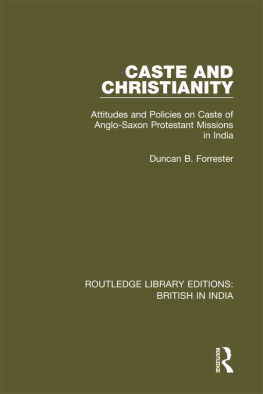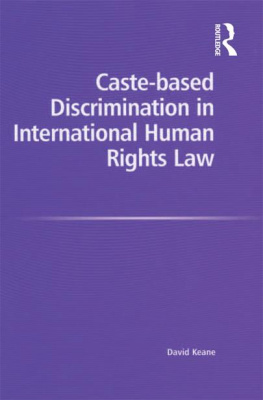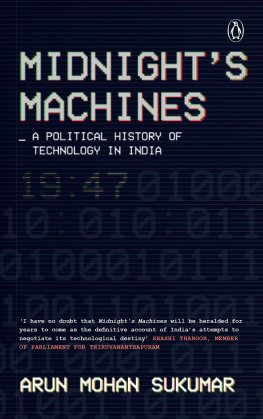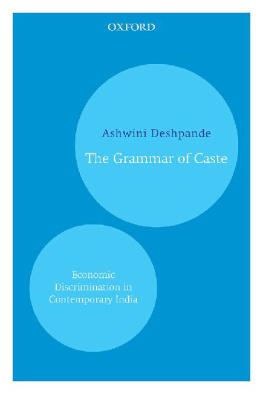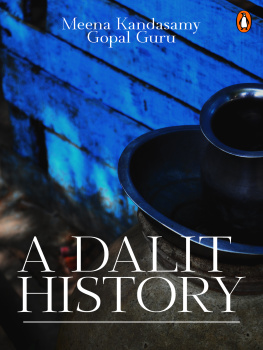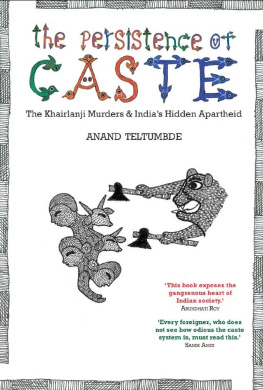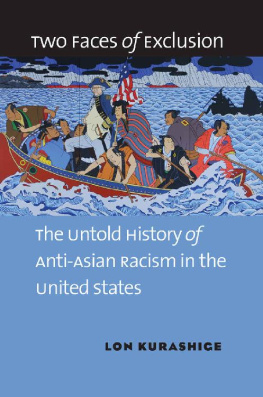N. Sukumar - Caste Discrimination and Exclusion in Indian Universities
Here you can read online N. Sukumar - Caste Discrimination and Exclusion in Indian Universities full text of the book (entire story) in english for free. Download pdf and epub, get meaning, cover and reviews about this ebook. year: 2022, publisher: Taylor and Francis, genre: Politics. Description of the work, (preface) as well as reviews are available. Best literature library LitArk.com created for fans of good reading and offers a wide selection of genres:
Romance novel
Science fiction
Adventure
Detective
Science
History
Home and family
Prose
Art
Politics
Computer
Non-fiction
Religion
Business
Children
Humor
Choose a favorite category and find really read worthwhile books. Enjoy immersion in the world of imagination, feel the emotions of the characters or learn something new for yourself, make an fascinating discovery.
Caste Discrimination and Exclusion in Indian Universities: summary, description and annotation
We offer to read an annotation, description, summary or preface (depends on what the author of the book "Caste Discrimination and Exclusion in Indian Universities" wrote himself). If you haven't found the necessary information about the book — write in the comments, we will try to find it.
N. Sukumar: author's other books
Who wrote Caste Discrimination and Exclusion in Indian Universities? Find out the surname, the name of the author of the book and a list of all author's works by series.
Caste Discrimination and Exclusion in Indian Universities — read online for free the complete book (whole text) full work
Below is the text of the book, divided by pages. System saving the place of the last page read, allows you to conveniently read the book "Caste Discrimination and Exclusion in Indian Universities" online for free, without having to search again every time where you left off. Put a bookmark, and you can go to the page where you finished reading at any time.
Font size:
Interval:
Bookmark:
A philosophically, theoretically and empirically well organized book which traces the untold narratives of sufferings of students of castes located at the lowest ebb of the hierarchically structured Indian society from an evolutionary perspective. Methodologically, it substantiates its findings with the collection of comprehensive primary and secondary data about representation of various social groups in the India university system. On the one hand, the book successfully deconstructs the myth of merit prevailing in the Indian academia. On the other hand, it reveals the creativity and reflexivity of the students belonging to lower castes with new metaphors. On the whole the book takes us to new horizons of imagination about Indias higher education and reminds us about Freres prophetic word, pedagogy of the oppressed will be written by the oppressed which will emancipate the oppressor and the oppressed both. I am confident it will be welcomed with open arms by both generalists and specialists.
Vivek Kumar, Chairperson, Centre for the Study of Social Systems, School of Social Sciences, Jawaharlal Nehru University, and Visiting Professor at Columbia University, New York, USA
Rigorously researched and persuasively argued, Caste Discrimination and Exclusion in Indian Universities: A Critical Reflection by Narayana Sukumar opens us for scrutiny the legacies of injustice that pervade our institutions of higher learning. Narayana Sukumar unravels the university as a system of non-discriminatory public access to education to reveal the continuing pervasion of caste-hierarchies in the institutional and social space of the university. Taking recourse to empirical data pertaining to enrolment and employment of Dalit students and teachers in universities, and personal narratives of betrayal and incremental exclusions, Narayana Sukumar, weaves together a scathing critique of what he calls the social cosmology of merit and the pervasiveness of structural inequalities. While the merit discourse has assumed various forms, the pandemic has exacerbated the fault-lines along which caste, class, and gender have played out shaping Dalit experiences. Indeed, structural inequalities have become manifest in quotidian experiences of humiliation and often also in spectacles of death social and material. Policies, including those of affirmative action and grievance redressal in universities, and participatory channels in universities, e.g., in the recruitment process, become symbolic and not emphatic. This is an important and relevant book an indispensable reading for anyone who wants to make sense of the social, political and material basis of universities in India.
Ujjwal Kumar Singh, Professor of Political Science, Delhi University, India
This book studies the exclusion and discrimination that is meted out to Scheduled Caste (SC) students in the Indian Higher Education system, and the psychosocial consequences of such practices. It foregrounds the conceptual debates around caste, exclusion, and reservations in Indian academia, discussing the social dominance and the roots of prejudices in the university spaces.
The volume reflects upon the fragile social world in which students from the margins struggle for survival in the academic space. It reveals that these students navigate the various facets of academia like classrooms, pedagogy, scholarships, hostels, peer groups, and teachers only to find the academic space a dystopian universe. The book also sheds light on suicide cases committed by the marginalized groups as a testimony of protest.
Based on in-depth ethnographic research, this book will be of interest to teachers, students and researchers of education, sociology, political science, psychology, and exclusion studies. It will also be useful for policymakers, social activists, NGOs, research centers, and those working in higher education, reservations, public policy, caste, and exclusion studies.
N. Sukumar teaches Political Science at Delhi University, India. His area of interest includes Indian Political Thought, Ambedkar and Dalit Bahujan Studies, Human Rights and Social Exclusion. Currently, he is engaged on Dalit Citizenship and Anti-Caste Utopias. He is also member/advisor for many professional bo dies in many Central Universities and other institutions. He has published widely in research journals, blogs etc. and has been involved in both national and international research studies on poverty and public institutions, caste-based atrocities, and discrimination. Apart from the classroom, he is also actively involved in grassroots peoples struggles.
Caste Discrimination and Exclusion in Indian Universities
A Critical Reflection
N. Sukumar

First published 2023
by Routledge
4 Park Square, Milton Park, Abingdon, Oxon OX14 4RN
and by Routledge
605 Third Avenue, New York, NY 10158
Routledge is an imprint of the Taylor & Francis Group, an informa business
2023 N. Sukumar
The right of N. Sukumar to be identified as author of this work has been asserted in accordance with sections 77 and 78 of the Copyright, Designs and Patents Act 1988.
All rights reserved. No part of this book may be reprinted or reproduced or utilised in any form or by any electronic, mechanical, or other means, now known or hereafter invented, including photocopying and recording, or in any information storage or retrieval system, without permission in writing from the publishers.
Trademark notice: Product or corporate names may be trademarks or registered trademarks, and are used only for identification and explanation without intent to infringe.
The views and opinions expressed in this book are those of author and do not necessarily reflect the views and opinions of Routledge.
British Library Cataloguing-in-Publication Data
A catalogue record for this book is available from the British Library
Library of Congress Cataloging-in-Publication Data
A catalog record has been requested for this book
ISBN: 978-0-367-55689-1 (hbk)
ISBN: 978-1-032-29051-5 (pbk)
ISBN: 978-1-003-09529-3 (ebk)
DOI: 10.4324/9781003095293
To my grandmother (Boosamma), who was my first teacher
The Indian Constitution recognized the past injustices of untouchables and made provisions to ensure equality and non-discrimination on its adoption in 1950, thus overturning the regulatory framework of caste system based on the rule of graded inequality mandated by the Manusmriti. This is exemplified by the following constitutional provisions. Article 14 states, The State shall not deny to any person equality before the law or equal protection of the law. It also prohibits discrimination on the grounds of religion, race, caste, sex or place of birth. Article 15 of the Constitution emphasizes that the State shall not discriminate against any citizen on the grounds only of religion, race, sex, place of birth. The most important are the provisions in Article 17, which point out that Untouchability is abolished and its practice in any form is forbidden. The practice of untouchability was made a punishable offence in accordance with law. Further in Article 46, The Directive Principles of State Policy points out that The State shall promote with special care the educational and economic interests of the weaker sections and in particular, of the Scheduled Castes and the Scheduled Tribes and shall protect them from social injustices and all forms of exploitation. Thus, the Constitution not only recognized equality, but promoted equal opportunities and the principles of non-discrimination in the public sphere, while making the observance of discrimination based on untouchability an offence subject to punishment. The State also had the responsibility to frame laws and develop policies for the weaker sections, particularly for the Scheduled Castes and Scheduled Tribes to overcome social injustices.
Next pageFont size:
Interval:
Bookmark:
Similar books «Caste Discrimination and Exclusion in Indian Universities»
Look at similar books to Caste Discrimination and Exclusion in Indian Universities. We have selected literature similar in name and meaning in the hope of providing readers with more options to find new, interesting, not yet read works.
Discussion, reviews of the book Caste Discrimination and Exclusion in Indian Universities and just readers' own opinions. Leave your comments, write what you think about the work, its meaning or the main characters. Specify what exactly you liked and what you didn't like, and why you think so.

